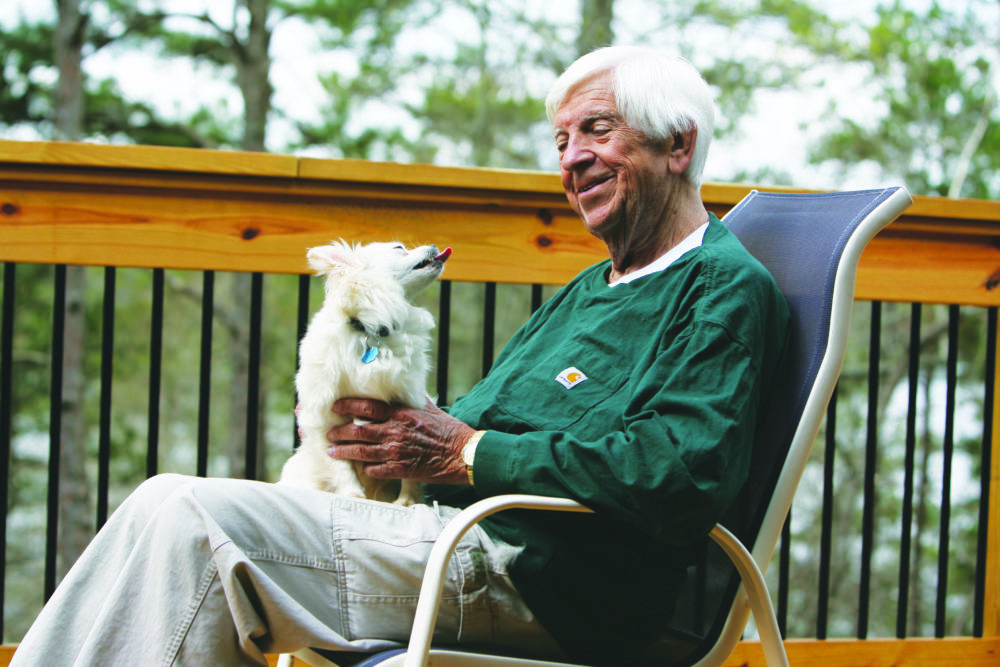
PETS: Benefits and Concerns
By – Caroline Bell, owner, Preparing for Care
(with Lisa Marie Carter)
Research shows that owning a pet improves a senior’s overall quality of life by providing physical, emotional and social benefits. Even occasional interactions with animals in a long-term care setting can enhance residents’ mood and behavior.
Caroline Bell, a senior care advocate and avid animal lover has experience with seniors and their pets and shares some suggestions. While Bell recommends seniors own an older pet — which is likely less rambunctious — she also says they should consider that older dogs are harder to adopt into new homes. If you are searching for a dog for an older person, the natural idea would be to find a trained, small breed dog. Breed lists are available but be cautious of these. They are only suggestions. After all, every poodle is not the same docile lap dog, just as all pit bulls are certainly not aggressive. Best advice is to talk to your local veterinarian.
If you’re a caregiver for an older person, or older yourself, and considering getting a pet or already have a pet, you’ll want to read this.
What are the daily responsibilities of owning a dog? Walking, access to outside, exercise for the dog. Maybe the elder still wants to take their dog for a walk at age 75, but will they be doing this at age 85, when their pup is still spry? It’s not unheard of for many dogs to live to be 18.
Health concerns. This can range from the simple feeding of a healthy pet to the more complicated issues of the elderly human owning and caring for the elderly canine. Elderly can easily mess up their own medications with the dog’s, a serious concern. Then there’s the problem of getting the pill into the animal! Administering medicine can be a challenge for an owner of any age. We all know that. Giving pills, cleaning ears or putting in eye medication becomes much more difficult with arthritic fingers and a very intelligent pup, who knows he’s got the goods on those slower hands.
Grooming. From simple brushing out, to bathing, trimming nails to finding car rides to the groomer, are you going to be there to help when the simple tasks become too much?
Expense. Buying food is one thing then also add flea products, heartworm preventive, vet visits, dog walking services. An elderly fixed income is one thing, but what if the owner is suddenly widowed? There goes a Social Security check as well as all the caregiving that the other spouse was doing.
A big concern and source of anxiety sometimes simply involves talking. Most people would be surprised that talking about this with the elder could give them a sense of relief. Don’t just think, because you don’t want the dog that someone else will. You never know.
Unfortunately, friends or relatives often don’t get involved until there is a tragedy of sorts. Bell deals with these frequently.
If the elder already owns a pet, try to put a support system in place before something bad happens. Family members may be able to find volunteers, neighbors or pet sitters/walkers for a small fee to help. Local animal rescue groups may be of help. Bell recommends that seniors plan to find a family member who will be willing to take care of the pet, either temporarily or permanently. Almost all long-term care communities, if they don’t allow residents to keep pets, allow pets to visit if they have their vaccination records, so seniors should choose a family member who lives nearby and can bring the pet to visit, Bell said.
Bell also suggests that seniors should consider designating someone to have power of attorney over their pet, in case they are no longer able to take care of it.
HOW TO SAFELY CARE FOR YOUR PET
Use a harness instead of a retractable leash to prevent tripping.
Make sure your pet has access to regular veterinary checkups and have a plan in place if you cannot drive to the vet.
Own an older pet or understand that younger pets can be rambunctious.
Take rambunctious or loud dogs to training classes to calm them down.
HOW TO PLAN AHEAD FOR YOUR PET
Identify assisted living facilities that accept pets.
Identify a close family member who will be willing to keep the pet and bring the pet to visit you, if possible.
Identify an animal rescue or sanctuary for the pet.
Designate a person to have power of attorney for your pet and assign the pet a dollar value.



